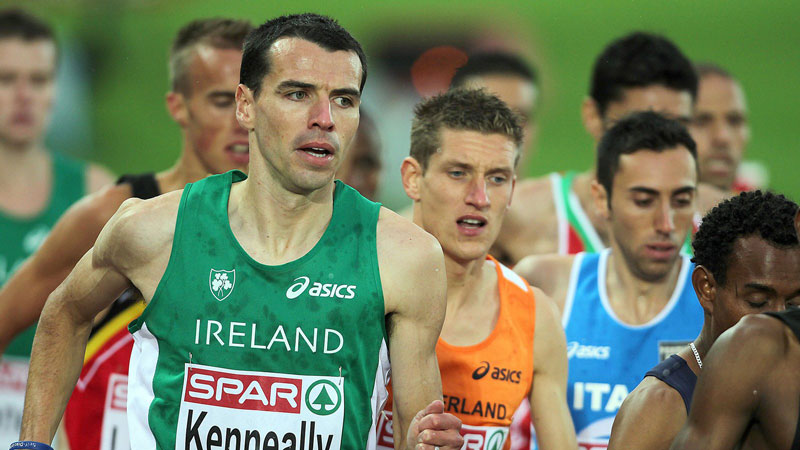Mark Kenneally blames Trinity’s Bernard Donne. Actually, that’s not quite right. Blame, certainly, is not the right word for the “blunt, honest assessment” that pushed Kenneally into the big bad world of marathon running, a world in which he excelled so much that he ended up meeting an Olympic qualifying time in his second marathon. It is perhaps not quite accurate, either, to say that Donne, heading up Trinity’s Human Performance Lab, deserves all the credit for Keneally’s marathon success. That narrative, tempting as it is, is too simplistic. But herein lies the danger when talking to Kenneally.
He’s not what you’d call an interviewer’s dream, Kenneally. There are no easy headlines, no gripping tales of triumph over adversity. At least, not how he tells it. The Celbridge-born physio, one of 57 Trinity graduates ever to represent Ireland in the Olympics after running in London in 2012, is pleasant throughout our phone conversation – straightforward, unassuming, ever-ready to engage. But if this reporter is looking for an easy story, Kenneally does not oblige. “It was brilliant, don’t get me wrong”, he says of the Olympics, “but you can certainly build it up too much in your head. There are really good athletes I know that haven’t been to the Olympics, and that shouldn’t be kind of … viewed as not having done that much in the sport. And that’s kind of the way I’ve looked at it”.
The Olympics was brilliant, don’t get me wrong, but you can certainly build it up too much in your head
Case closed, then. Kenneally, the reluctant Olympian. Except that’s not true either. “From a youngfella, that [the Olympics] was what it was. For me, from a young age, that was what I wanted to do. If I wasn’t going to be a professional footballer, then I wanted to go to the Olympics.”
The truth of the story, it seems, is that Kenneally is just a very unobtrusive man. The successes are in there, the struggles too, but he never has the effrontery to tell these stories as though they were important, instead framing them as though they were nothing more than everyday life occurrences.
In reality, though, as one of Trinity’s few elite athletes in the past number of years, Kenneally’s stories are important. And, whether he likes it or not, they are outside the realm of the everyday.
Around the turn of the millenium, Kenneally was a law student in University College Dublin (UCD). He realised he didn’t like it, dropped out, and applied for physio in Trinity. “That was 2002 I started in Trinity”, he remembers, “so I would’ve been 20, 21 at that point, and just went from there”.
He obtained a sports scholarship from the College, in return for which he pledged his services to Dublin University Harriers and Athletics Club (DUHAC). “I think”, he offers, “I won the cross-country, the universities cross-country, my first two years”. With help from Trinity’s scholarship programme? “Ehm…” he chews on the idea. “I think it has developed an awful lot more since then. I think at the time we got about 250 or 300 euro, and there would have been access then to the lab, which I was using anyway … I think in the early 2000s, Trinity was very much much more focused on some of the other sports at that point. So athletics probably wasn’t as well developed. But I mean, the testing was very helpful, obviously. So yeah, it was good, it was one of those things where, when you’re a student, every little helps.”
Not exactly the high-level training a budding athlete dreams of, then. However, it is here we come back, via Aubrey Storey, then captain of DUHAC, to Donne. “Aubrey was great”, Kenneally asserts, sincerely, before moving onto Donne: “Bernard has been great with me over a number of years, from sort of 18, 19, when I first tested with him, over a period of 10 or 11 years after that.” These were crucial years. With Kenneally pursuing a career as a 5,000-metre runner, Donne, “fairly honest” as always, set him straight. “I can’t remember what year it was, it might have been ’06 or ’07”, Kenneally remembers, with what sounds distinctly like a chuckle. “After one of my tests, Bernard basically told me 5,000 wasn’t going to be something I was going to excel in, and that marathon was something that I could run fast in.”
After one of my tests, Bernard basically told me that marathon was something that I could run fast in
If, at this point, you think switching tracks was a risk for Kenneally, traumatic even, then you haven’t been paying enough attention. He lopes towards the Olympics, the climax of this story, with trademark modesty.
“Ehm, so … I finished 2006 in Trinity. I was working away as a physio, I did a year, a year and a half in hospitals, and then I was working in private practice. And … I was tipping away, I was running okay. The 2008 Olympics were on my mind at that point. But I just couldn’t seem to get good enough form together to get myself in shape to do it. I changed coaches in 2008, 2009, to a guy called Mark Carroll, who would have been an Irish record holder over a number of different distances. Under him, I improved fairly steadily over 2009 into 2010 … At the time, I was staying injury-free, I was getting a consistent run of training, I was getting faster over shorter distances.”
“And then”, he says, “it got to the end of 2010, and realised at that point that I was in a position where the Olympics were realistic. And everything kind of fell into place”. And Trinity graduate Mark Kenneally ran for Ireland, in his third ever attempt at a marathon, at the Olympic Games. Just don’t ask him to talk about it.







